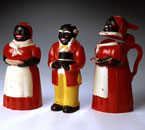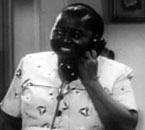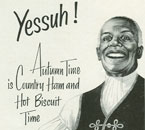You were born into a society which spelled out with brutal clarity, and in as many ways as possible, that you were a worthless human being. . . . The details and symbols of your life have been deliberately constructed to make you believe what white people say about you.
-James Baldwin, The Fire Next Time (1962)
The black servant was one of the most common stereotypes at the dawn of the modern movement. The black domestic was a stock character in mainstream visual culture: kindly, ever-vigilant souls cooked, scrubbed, ironed, raked, hauled, planted, and chauffeured their way into scores of productions and publications.
Like the character Joe in Show Boat—or any number of images that placed African Americans in a limbo between slave and free man—such depictions would not have been perceived as either grotesquely racist or overtly progressive by most Americans at the time. Yet they were sufficiently positive and demeaning to satisfy a broad audience, whether through the films of liberal Hollywood producers, the magazines of African American publishing companies, or the newspapers of the segregationist South. The imagery was at once cynical and nimble, affording African Americans a token presence in popular culture while affirming the supremacy of white people.
Image Credits/Captions (Click on thumbnails for full image)
Aunt Jemima Syrup Dispenser, c. 1950s, Plastic. Height: 5 1/2 in. Collection of Civil Rights Archive/CADVC-UMBC, Baltimore, MD, 2005.92; Aunt Jemima and Uncle Mose Salt and Pepper Shakers, c. 1950s. Plastic. Height: 5 in. and 5 1/16 in. Collection of Civil Rights Archive/CADVC-UMBC, Baltimore, MD, 2005.93.1, 2005.93.2
Still from The Beulah Show, 1952. The first nationally broadcast series to feature an African-American actor in a leading role, The Beulah Show focused on the whimsical antics of a housekeeper who worked for a prosperous white family. Civil rights leaders denounced the half-hour situation comedy for its demeaning portrayal of African-Americans.
Old Virginia Yessuh, 1954. Collection Civil Rights Archive, /CADVC-UMBC, Baltimore, MD.


